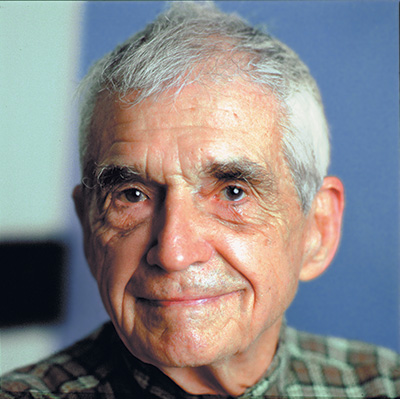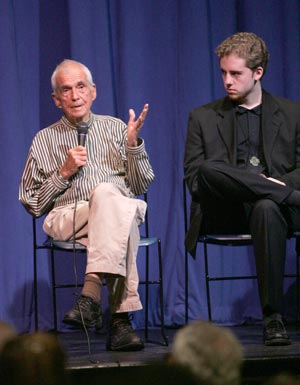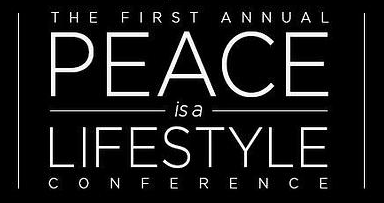Father Pfleger’s South Side contingent of 30 people was greeted by nearly 700 area residents, many of whom are city workers, particularly police. The residents threatened the South Side parishioners with violence and death threats and considered him—a white Catholic—as a traitor, he said.
Such racially charged demonstrations will become more prevalent in the coming years, he warned, and it will require unity among like-minded activists seeking social justice for all races.
“Dr. Martin Luther King said that the moment that we become just a black organization, we lose,” said Father Pfleger, delivering the Graduate School of Education’s Centennial Lecture on Dec. 5 in impassioned tones. “We must be with Muslims, Christians and Jews, with white and with brown and with black. We must show that there’s a unity we have that is more powerful than the unity of those against us. He was right.”
He said that with hate speech and white nationalism on the rise, efforts to unite have not been this difficult since the 1950s and 1960s.
“If we connect with each other, I have no question that we can turn this thing around,” he added. “I’m a Christian, so I’m a prisoner of hope. It’s not if we can; it’s if we want to.”
Father Pfleger’s talk, titled “America Needs Game Changers,” honored the legacy of Fordham professor Barbara L. Jackson, Ed.D., whom GSE Dean Virginia Roach, Ed.D., called “one of the first African-American female leaders in a system of education that didn’t largely recognize African-American leaders nor female leaders.”
Like Jackson, Father Pfleger was a game changer. In the 1970s, he took over what was once a predominantly Irish Catholic parish on the South Side of Chicago as the parish gradually attracted greater numbers of African Americans. His efforts on behalf of his new congregants often put him at odds with Church leadership and City Hall, but his leadership has helped make St. Sabina Church one of the largest black Catholic congregations in the nation.
Father Pfleger said that he likes speaking to student audiences, because they’re more willing to take action than older adults who are already “waiting to go to heaven or hell.” Addressing an audience of many future teachers, he advised GSE students going into underserved neighborhoods to listen and learn from their communities, particularly if they come from a different background.
“If you are a white person like I am, in an all-black community, then understand every day: ‘I am a visitor in somebody else’s community; I don’t know the community better than they do.’”
He also encouraged the future teachers to live in the community they teach and to believe that every child in that classroom is as gifted and talented as the teacher.
“Don’t come in thinking you’re doing some nice thing in the black or brown community,” he said. “If you have that kind of attitude, please get out.”
He reminded them that teachers learn from their students.
“These are great minds,” he said. “If you ever wonder how brilliant our young people are, [remember that]these are young people who survive with no resources, no help, and no support—but they survive in the midst of it all.”
]]>That was the question posed on Oct. 23 at “Keep Fracturing the Good Order: Daniel Berrigan, the Long Haul, and the Big Heart,” a lecture that celebrated the life of Daniel Berrigan, S.J., and advised on how to survive peacefully in today’s world.
Speaker Anna J. Brown, Ph.D., of St. Peter’s University in Jersey City, New Jersey, was a friend and colleague of Father Berrigan. She met him through the Kairos Community, a peace community Father Berrigan started in the late 1970s. She described him as a “human being who was deep in prayer, faith, and soul.”
“Dan spent his life fiercely committed to nonviolence, being genuinely loving to all and centered in faith and community,” said Brown. “He constantly worked for peace in the world.”

Father Berrigan is remembered as “sometimes an anarchist, always a pacifist” who spent his life protesting against violence and “American military imperialism.” As one of the Catonsville Nine Catholic activists, he became the first priest to be on the FBI’s most-wanted list, for burning military draft files. With others, he became a symbol of the anti-war movement during the United States’ involvement in Vietnam.
Father Berrigan served as Fordham’s poet-in-residence from 2000 until his death in April of this year, and often spoke to classes, in conjunction with the Peace and Justice Studies Program. He was a peace activist until his death.
“He participated in the Occupy Wall Street Movement when he was 90 years old,” said Brown. “He was so dedicated to peace and fairness, he gave everything he physically could.”
The lecture focused on key events, such as climate change, weapons dealing, war, and mass migration, that hamper the quest for peace. Brown invited those in attendance to join “the tribe of big hearted people” who act as bearers of light for the world.
“We, like Dan, must be the opposite of hyper-individualism,” said Brown. “We must root ourselves in a community that pulsates love and radiates life.”
The event marked the Tenth Annual Julio Burunat, Ph.D., Memorial Lecture. Burunat, a Fordham alumnus who received doctoral degrees in both philosophy and theology from the Graduate School of Arts and Sciences, lived Murray Weigel Hall on the Rose Hill campus as a Jesuit scholastic. Theology professor J. Patrick Hornbeck II, D.Phil., said the series hosts talks that “advance conversations about theology and religion that are both appreciative and critical.”
“We consider sharing these conversations with the broader world an obligation,” said Hornbeck. “We feel honored to extend these experiences to people who otherwise would not be able to have them.”
–Mary Awad
]]>Father Berrigan, Fordham’s poet-in-residence since 2000, died at the Jesuit residence Murray-Weigel Hall on April 30 at age 94. He was an accomplished poet and co-founder, along with his brother Philip, of the Plowshares Movement, an anti-nuclear and Christian pacifist group.

Photo by Peter Freed
“Dan Berrigan was a giant among us. Whatever one makes of his methods, his lifelong pursuit of peace and justice was both heartfelt and critically important,” said Joseph M. McShane, SJ, president of Fordham.
“He belongs not just to the Jesuits, but to a significant period in American history. His activism came from a poet’s heart—and indeed he was always a highly accomplished poet, a poet who drew his inspiration from the Prophets and the Gospel. His fluency never failed him, and we were blessed to have him for so long as Fordham’s poet-in-residence.”
The Plowshares group was active throughout the 1960s and 70s, and gained notoriety in 1968 when the Berrigans and seven others used homemade napalm to burn draft files in the parking lot of a U.S. Selective Service Office in Catonsville, Maryland, in protest of the Vietnam War. Father Berrigan was convicted of destroying government property and received a three-year sentence in federal prison.
In 1980, the Berrigans and six others broke into a General Electric nuclear facility in King of Prussia, Pennsylvania, damaged nuclear warhead nose cones, and poured blood on documents in the facility. Their arrest and the legal battles that followed were chronicled in the 1982 film In The King of Prussia.
From 1970 to 1995, Father Berrigan spent an estimated seven years in prison for his peace activism, which included protests against the 1991 Gulf War, the U.S. invasion of Afghanistan, and the 2003 invasion of Iraq. In June 2012, he lent his support to the Occupy Wall Street movement with a visit to Zuccotti Park.

Photo by Bruce Gilbert
Father Berrigan was born in Virginia, Minnesota, in 1921, and entered into the Society of Jesus directly out of high school in 1939. He was ordained in 1952.
In addition to his activism, Father Berrigan was lauded for his writing. His first poem appeared in America Magazine in 1942 while he was a student at the Jesuit seminary St. Andrew-on-Hudson. His first book of poetry, Time Without Number, (The MacMillon Company, 1953), won the Lamont Poetry Prize in 1957. In all, he wrote more than 50 books and various articles and commentaries.
At the request of Father McShane, in 2006 Father Berrigan penned Ordina questo amore, O tu che m’ami: Recitative for Four Voices; Ignatius, Francis Xavier, Peter Faber and Chorus, timed for the Jesuit Jubilee Year. The 2007 performance piece, which was was set to music by composer Elizabeth Swados, celebrated the genesis of the Society of Jesus, which was founded in 1541 by St. Ignatius Loyola, Francis Xavier and Peter Faber.
Robin Andersen, PhD, professor of communications and former head of Fordham’s peace and justice studies program, said Father Berrigan ran seminars for Fordham faculty on how to teach peace, and also taught courses for students such as Poems by Poets in Torment.
She said that he provided great comfort to students whose faith in peace was shaken by the events of 9/11.
“There were calls to bomb Afghanistan, and I remember one of his students asked him, ‘How can you still have a peace attitude after this?’ Father Berrigan told him ‘Well you know, being a peace activist between wars is kind of like being a vegetarian between meals,’” Andersen recalled.
His writing and activism occasionally intersected, as in The Dark Night of Resistance (Doubleday & Company, 1971), which he wrote in 1970 while he was in hiding from the FBI on federal charges.
In interviews, Father Berrigan credited Dorothy Day with piquing his initial interest in antiwar activism. He said, while he was teaching at Brooklyn Preparatory School, Day had sent a student pacifist to him who sought instruction in the Catholic faith and peace. The musings of John Cuthbert Ford, S.J. on the morality of saturation bombing—such as the firebombing of Dresden in World War II—further convinced him to oppose war.
In a 2012 interview for Faith, Resistance, and the Future: Daniel Berrigan’s Challenge to Catholic Social Thought (Fordham University Press 2012), Father Berrigan was asked to reflect on how things had changed in the 44 years since his arrest for the Catonsville event.
“The mass[es]of our people are victimized by politics and by the media,” Father Berrigan wrote. “We are called to be sensible and realistic about the state of our world without being completely absorbed into it, so that we have nothing to say about it, nothing to do about it.”
“I think, if we stop with just the analysis of how bad things are, we miss the point of the Gospel, which is saying to us in various ways [and]in all sorts of ways what is to be done.
“One is called to live nonviolently, even if the change one works for seems impossible. It may or may not be possible to turn the U.S. around through nonviolent revolution. But one thing favors such an attempt: the total inability of violence to change anything for the better.”
The wake and funeral arrangements for Father Berrigan are as follows:
Thursday, May 5:
2-5 pm and 7-9 pm, Wake
Church of St Francis Xavier
46 W. 16th St., New York, NY
Friday, May 6:
7:30 am, Peace Witness and March to Xavier. Assemble at Mary House, 55 East Third St, New York NY
Mass at 10 am
Church of St Francis Xavier, 46 W. 16th St., New York, NY
Donations in his memory may be made to the Fr. Daniel Berrigan, SJ Fund for Social Ministries, Jesuits USA Northeast Province at sjnen.org/donate. The Province has also has created a memorial Peacemaking Fund, which will directly support peacemaking efforts at a wide range of Jesuit works along the entire eastern United States.
]]>Next week, activists will gather at Fordham to send the message that no amount of violence should be tolerated.

On Saturday, June 28, Fordham University and BK Nation, in conjunction with Erica Ford’s Life Camp, will host the inaugural “Peace is a Lifestyle” conference at Fordham’s Lincoln Center Campus. The conference will tackle serious societal issues including gun violence, hate crimes, bullying, and violence against women and girls.
Peace is a Lifestyle Conference
Saturday, June 28
9 a.m. to 3 p.m.
Pope Auditorium | Lincoln Center Campus
113 West 60th Street, New York City
The daylong gathering will feature prominent speakers, as well as activists, advocates, academics, elected officials, and concerned community members of all ages.
“We want to galvanize a lasting coalition of anti-violence advocates from around the five boroughs. There are a lot of groups that are loosely working together, but we feel that there needs to be more of a collaboration, sharing information and resources,” said Kevin Powell, president and co-founder of BK Nation.
“It’s also important for the city to see this, because there is no [single]office in New York City that funds these sorts of efforts, which we think are critical. There are smaller offices that deal with discrete issues, but we feel there needs to be an overarching initiative to address violence.”
Powell, who will deliver the conference’s keynote address, has already worked extensively to curb violence in New York City through BK Nation, a national organization that promotes community activism to address matters such as education, civic engagement, health and wellness, and job and small business creation.
“Violence is an epidemic in our country. If you look at the last couple weeks alone, with the shootings in California and Oregon, you’re almost bracing yourself for the next tragedy,” Powell said. “We don’t think violence should ever be normalized in our society. There should be an outcry about these types of things happening. It should never be the case that people feel the solution to a problem is to commit a violent act against others.”
In addition to identifying pressing violence-related issues in the city, the conference will explore possible solutions and actions that communities can take to bring the city closer toward peace.
“In the wake of violent acts that are taking place both here and around the world, people in our communities are feeling hopeless. We are increasingly aware of the violence, but unaware of the groundbreaking work that’s being done in the anti-violence movement,” said Priscilla Dyer, special projects administrator for theGraduate School of Social Service (GSS).
“With this conference, we hope to go beyond talking about the problems to formulating viable solutions moving forward,” she said.
The conference is free and open to the public. For more information, visit the conference website, email Priscilla Dyer, or call 212-636-6623.
— Joanna Klimaski Mercuri